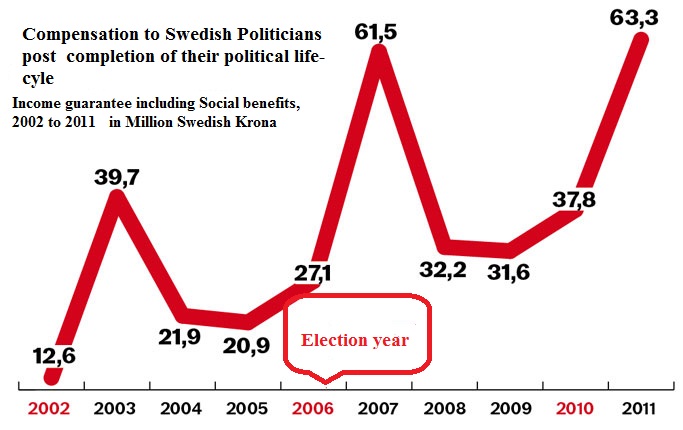Political
Economy
The
Market Quotes Powered By Forexpros, the Forex, Futures, and Stock Markets Portal.
Swedish politicians also after the big individual money as ex-politicians are paid record-high compensations
Tuesday, 13 March 2012
How productive
are politicians? This question is very important in the wake of news
that more Swedish politicians and ex- politician fixed their lives for
good with increased pays and benefits. This is similar to company’s
bosses that pay themselves big bonuses irrespective of the performances
of their companies.
Politicians are
said to be useful in that they will bend backwards to help the economy
and us the individuals and companies grow and make better livings. Do
the politicians really do this or are they there only for themselves?
At first it was thought that Swedish politicians were better when
compared to others from more vocal countries such the USA or UK. In
these countries politicians there have been explicitly shown to have
gone into the sector for their own self aggrandisement rather than
their communities. It turns out that in Sweden this is also what is
happening with the politicians.
At a time when
the economy has been wobbly and unemployment is rising especially in
deprived communities, such as in Rosengård in Malmö, Angered in
Gothenburg among others, no politician has taken it as a task to try
and stamp out his or her name in changing these communities and bring
them into the fold of the Swedish economic stream. But what we see and
hear is hot air, talks and no action and yet they seek huge pays
whether they are in government or retired.
Why can't Swedish politicians behave like those in other affluent
countries such as the UK or the USA where politicians can cut
themselves from their lofty towers and main stream and go down and work
closely with these deprived communities and expose and propel them into
the real production chain of the society as a whole remain puzzling.
speeches, speeches, speeches - hot air, hot air hot air.
Evidence of
this is Skr63.3 million paid last year to the former MPs who have not
found any work. This bill has been passed to the tax payer adding them
more burden and driving then to the ground.
Retiring
parliamentarians that have sat there for three years and have not yet
reached retirement age are entitled to so-called income guarantee. It
was design to act as economic aid during a transition period but not
intended as a sustainable livelihood. Despite this, some of the former
members have received such compensation of up to 15 years.
According to figures provided by the Swedish parliament newspaper, Parliament and Department (Riksdag & Departement) show that the payment of income guarantee, including social costs, has increased sharply over the past ten years.
Last year,
parliament paid out more money than ever into guaranteed income: Skr
63.3 million gross. This beg the question – if parliamentarians feel
that the jobs market was easy why do they find it hard to find a job
after leaving parliament or are they just sponging from the system
which also protect them more?
 Patrik Öhberg, a political scientist at the University of Gothenburg, is not particularly surprised by the development.
“It looks the
same in Finland. There are also up in record levels after the last
election,” he told the Swedish daily Dagens Nyheter.
One
explanation, according to Patrik Öhberg, is that the turnover of MPs
has become ever greater. Nowadays about a third of MPs are replaced
after each election.
“The fact that
we have received an increased turnover of MPs raised the question
whether it is reasonable that they should receive compensation for only
a few years in parliament.
But the problem
is that if one were to cut down drastically on these compensation
schemes then perhaps politicians would cling to their positions at all
costs, with all that implies,” says Patrik Öhberg to the paper.
Several parties
now want to tighten the rules for the income guarantee. In November
2011 parliamentary board decided to appoint a parliamentary committee
to look at how generous the rules should be. By December 2012 the
Committee present its proposal.
We on this network waits would over to be the first to read line by line of the proposals.
By Scancomark.se Team
Patrik Öhberg, a political scientist at the University of Gothenburg, is not particularly surprised by the development.
“It looks the
same in Finland. There are also up in record levels after the last
election,” he told the Swedish daily Dagens Nyheter.
One
explanation, according to Patrik Öhberg, is that the turnover of MPs
has become ever greater. Nowadays about a third of MPs are replaced
after each election.
“The fact that
we have received an increased turnover of MPs raised the question
whether it is reasonable that they should receive compensation for only
a few years in parliament.
But the problem
is that if one were to cut down drastically on these compensation
schemes then perhaps politicians would cling to their positions at all
costs, with all that implies,” says Patrik Öhberg to the paper.
Several parties
now want to tighten the rules for the income guarantee. In November
2011 parliamentary board decided to appoint a parliamentary committee
to look at how generous the rules should be. By December 2012 the
Committee present its proposal.
We on this network waits would over to be the first to read line by line of the proposals.
By Scancomark.se Team
What do you think about this article
and us? Please leave a comment
 © Scandinavian Companies and Market
Magazine
2012. | Scandinavian
Companies and Market and Scancomark are registered trade mark of
Scandinavian Companies and Market.
© Scandinavian Companies and Market
Magazine
2012. | Scandinavian
Companies and Market and Scancomark are registered trade mark of
Scandinavian Companies and Market.



